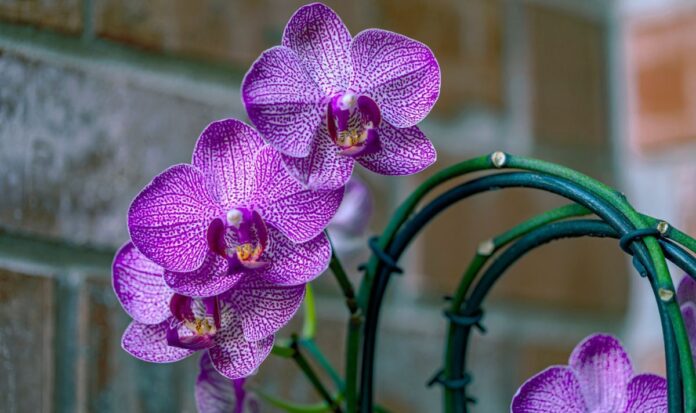It can be terribly frustrating and a bit disappointing to spend lots of time caring for your orchid just to watch it sprout buds that shrivel up and fall off – or never even bud at all. If your orchid isn’t blooming, don’t panic. There are a few key reasons why your houseplant isn’t bursting into bloom, and you can usually encourage your plant to flower by making some simple adjustments in your orchid care routine. Claire, orchid expert at Orchid Resource Center, has shared her top eight reasons why an orchid isn’t blooming and professional tips on how to coax your plant into its best bloom season yet. Light is very important to help your orchid produce the new leaf it needs for producing a flower spike. Claire warned: ‘Inadequate light conditions may be the number-one reason orchids fail to bloom or rebloom. Most popular indoor orchid types, such as phalaenopsis, dendrobium, cattleya, and cymbidium orchids, require bright, indirect light to bloom.’Ideally, place your plant out of the path of direct rays, but make sure it’s in a sunny room. For many orchid plants, south or east-facing windows are best. The expert noted that if orchids are kept in a dim room with little natural light, such as an office or north-facing room, they may need a grow light to encourage healthy and consistent bloom. ‘Reason two: Exposure to direct sunlight Orchids are very sensitive to light conditions. In their natural habitat, orchids typically enjoy dappled sunshine, and they’re mostly protected by thick tropical canopies. If an orchid is positioned in full, direct sunlight, gardeners may notice ‘sunburned or bleached leaves’, according to Claire. She said: ‘This is a symptom that will likely prevent bloom since your orchid will spend its valuable resources on healing rather than budding. If your orchid is positioned in full sun, you can simply move it a few feet back from the window or hang a sheer curtain to filter direct sun rays.’READ MORE: Five types of branches to remove from your Japanese maple ‘Number one reason’ an orchid is failing to bloom – ‘best’ way to get ‘consistent blooms’ (Image: GETTY)The orchid expert said: ‘Orchids produce big, long-lasting blooms when they’re able to engage in normal energy cycles. Typically, orchids produce energy in the form of carbohydrates during the day when temperatures are high, and rest at night when the temperatures typically drop.’She suggested that if orchids are not getting adequate light and still are not blooming, try dropping the temperature a bit at night. Claire noted: ‘The lower-temperature resting period is essential for triggering healthy, full blooms.’Reason four: The orchid has outgrown its potWhen orchid growing mix breaks down, their roots may not get proper ventilation. This can prevent bloom and affect the overall health of your orchid since epiphytes require air to ‘survive and thrive’. Choosing when to repot your orchid can be tricky. Some plants may not bloom for six months to a year after repotting. And some orchids actually prefer to be root-bound and will bloom best when they’re tightly contained in their pots. DON’T MISS’Worst room’ in the house to dry your clothes in – ’causes havoc’ [EXPERT]Dissolve ‘thick’ toilet limescale with ‘essential’ cleaning staple [TIPS]Banish ‘tough’ food stains from oven racks with 1 ingredient – ‘magic’ [COMMENT] As a general orchid-watering rule, always err on the side of under-watering (Image: Getty) Make sure you know the bloom cycles of your particular orchid (Image: Getty)Buying an orchid plant in bloom isn’t necessarily a good indicator of its blooming season. Growers and producers can easily induce bloom in greenhouses by manipulating light and temperature conditions. Make sure you know the bloom cycles of your particular orchid. A little research can save you months of wondering why your plant isn’t flowering. Reason eight: Incorrect fertiliser being usedOrchids aren’t heavy feeders. Their root systems are complex and delicate, unlike the root systems of other, more traditional houseplants. But don’t forget that your orchid needs food and nourishment to bloom and thrive indoors. The plant pro said: ‘Regular fertilisers can be too harsh and burn your plant, so the best orchid fertiliser will be gentle and specially designed for your orchid. If you’re looking for the perfect orchid fertiliser, we recommend our easy-to-use Premium Orchid Food. ‘We’ve diluted the standard orchid fertiliser ratio so you can safely fertilise your orchid at every watering without burning its roots. Our fertiliser spray is formulated to supply the correct nutrients to your orchids and requires no mixing or measuring. Just spray and watch those blooms explode.’


